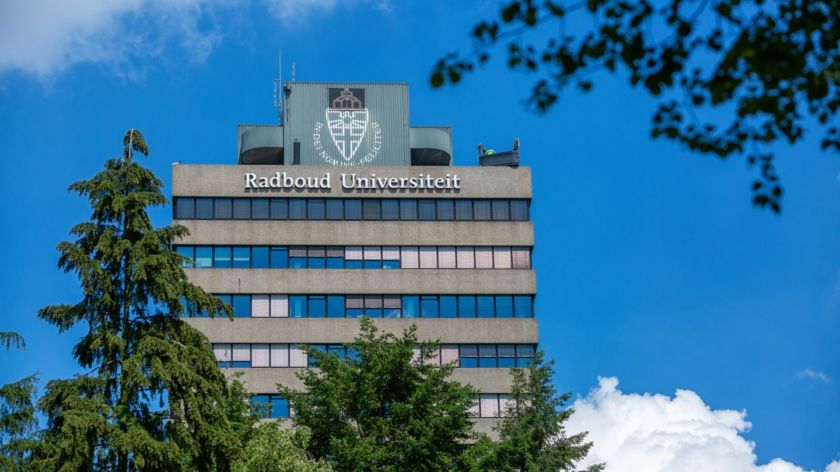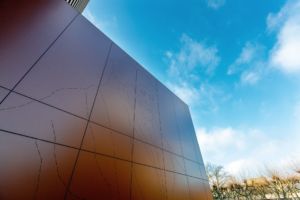Erasmus building employees will miss their own rooms and bookcases
-
 Photography: Dick van Aalst
Photography: Dick van Aalst
Around 2030 there will be a new building for the Faculty of Arts and the Faculty of Philosophy, Theology and Religious Studies at the site of the current Spinoza building. Workstations will no longer be exclusive to a single employee but will have to be shared. Employees in the Erasmus building will miss having their own rooms and bookcases, according to a survey by Vox.
Arjan Sterken is working on his dissertation in his room on the 17th floor of the Erasmus building. He has been making the daily commute to the Erasmus building for six years already: first as a student, then as a PhD candidate. ‘I have gotten pretty attached to the building’, he says.
Sterken is aware of the Campus plan which was discussed with the participational bodies. According to said plan, a large part of the Erasmus building will be used for student housing by 2030.The Faculty of Arts and the Faculty of Philosophy, Theology and Religious Studies will be moved to a new building at the site of the current Spinoza building. The amount of available office space will be pared down by 35%; no one will have their own separate workspace.
‘Flex spaces are inconvenient because they require you to haul your books with you’
This is very inconvenient, according to Sterken. Among other things, his bookshelves are filled with books on Ancient India. He needs these to be able to work on his dissertation on comparative religious studies. ‘During the Corona crisis we had a participatory meeting regarding the new construction’, he says. ‘During that meeting, us employees made it quite clear that we didn’t want open-plan offices. Flex spaces are also inconvenient, because they require you to haul your books with you every time. Hopefully our wishes will be taken into consideration.’
Own Bookcase
The news of the Campus Plan hadn’t landed yet with Esther Janse, nine floors down from Sterken. The associate professor of the Centre for Language Studies has had an office space in the Erasmus building since 2016. ‘I will definitely miss having my own office’, she says. ‘It is very nice to have your own space where you can work, talk to students, or take a Zoom call in peace.
Janse has fewer issues with leaving the Erasmus building. ‘It’s not a nice building and it is inconvenient that all the elevators are in the centre of the building’, she says. ‘You never have a good overview of who works on campus.’
Janse thinks it is awkward that she won’t have her own space in the new building. ‘A lot of employees are used to their own bookshelves and their own tea bags.
Open-plan Office
In the food corner on the sixth floor, we find two Dutch specialists enjoying their homemade sandwiches and a glass of buttermilk. The subject of the day is the new Campus plan. Adriaan Duiveman, literature expert and columnist for Vox, thinks that open-plan offices without private bookshelves would be hell. ‘A bookshelf is the academic’s extended mind.’
Whether they will miss the Erasmus building? ‘I would’, says associate professor Wyke Stommel. Duiveman agrees with her. ‘I was used to the University of Groningen, so I wasn’t immediately impressed by the Erasmus building’s aesthetic’, he says. ‘But it is a very efficient building. You can always run into someone inside; our floor has a good occupancy.’
‘A bookshelf is the academic’s extended mind’
Wilbert Spooren, Professor of Discourse Studies of Dutch, can understand the plans of the Executive Board. ‘The Erasmus building has a lot of office spaces that are empty part of the time, which costs a lot of money’, he says. ‘I wonder how many books on the shelves actually see use. I recently cleared fifty books from my own bookcase. But then I’m fortunate that a large part of my professional literature can be found online.
One Meter’s worth of Books
Spooren has already experienced one transition from private offices to flex spaces once before, at the VU (Du: Vrije Universiteit) in Amsterdam. ‘Shortly after the transition, employees started coming in very early in order to find a good spot’, he says. ‘But that quickly stopped, as a lot of people started working from home. It is very important to make good agreements regarding who will work on campus at what time.’
Johan Oosterman, Professor of Historical Dutch Literature, agrees after joining our table. ‘You could have a guideline that people work from home two days each week and three days on campus, but that only works if you can organise it per department’, he says. ‘Otherwise, you might never see your colleagues again.’
Spooren has one more recollection of a meeting at the VU where the architects came to explain the new building plans. ‘Employees were granted a bookshelf of one (1) meter’, he says.
Oosterman, dryly: ‘That’s precisely enough for a single stanza of Middle Dutch literature.’




